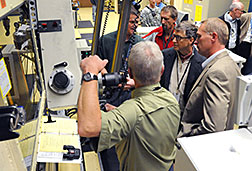- Number 400 |
- November 4, 2013
Bill Gates validates innovation role for national laboratories

Bill Gates (in glasses) views a containment
box in the Hot Fuel Examination Facility at
Idaho National Laboratory.
Privately funded research utilizing government owned facilities validates the important role national laboratories have in advancing innovation says Bill Gates, American business magnate and chair of the nuclear reactor startup company TerraPower, LLC.
TerraPower has engaged DOE's Idaho National Laboratory to support certain aspects of design for TerraPower’s traveling wave reactor. Gates and his stall recently toured the Materials and Fuels complex at INL. The visit focused on demonstrating the lab's expertise and capabilities.
During his visit he proclaimed studies conducted by scientists and engineers as “incredibly important.” When addressing employees after his tour Gates said, “Getting to visit INL was really enlightening. It was amazing to see reactor fuel analysis and how it can be conducted safely in a hot cell environment.”
“Terrapower has many cooperative projects and there are lots of partnerships, but our work with INL is singularly important,” said Gates. TerraPower has gained attention for both its traveling wave reactor design and the financial backing of clean technology investors. Several Cooperative Research and Development Agreements (CRADAs) established over the past few years enable the company to receive technical insight from the nation’s nuclear energy laboratory and use its vast capabilities.
CRADAs and other agreements exemplify how INL helps advance industrial development by sharing its expertise with both start-ups and established energy companies. The formal agreements signed with TerraPower are part of a long DOE tradition to make national lab capabilities available to businesses developing new technologies.
One of INL’s primary missions is to help develop nuclear fuels with significantly improved performance. As a result, the lab has extensive expertise in nuclear fuel behavior and design. The CRADAs between INL and TerraPower take advantage of this expertise and cover a number of areas from sharing data and analyses gleaned from operation of the Experimental Breeder Reactor-II, to fabrication and irradiation of advanced nuclear fuel rods followed by post-irradiation examination.
“When a private company, such as TerraPower, shows interest in what INL does and formalizes a partnership to utilize our expertise and unique infrastructure, we know that we are doing a great job and making a meaningful impact on nuclear energy development, “ said Kemal Pasamehmetoglu, INL’s associate laboratory director for Nuclear Science and Technology.
Such INL support is available and used by a number of companies in the nuclear energy industry, including other nuclear start-ups such as NuScale Power, and veteran companies such as Babcock & Wilcox, Westinghouse and General Electric. CRADAs and Work for Others agreements are just two of the mechanisms that enable private industry to access the expertise, facilities and capabilities that exist in DOE’s national laboratory complex.
TerraPower is a nuclear energy technology company, headquartered in Bellevue, Wash. It is a privately funded company with the mission to advance scalable, sustainable, low-carbon and cost-competitive energy solutions. TerraPower’s traveling wave reactor is a central project that presents new innovation opportunities in the fields of engineering, physics and computer science.Submitted by DOE’s Idaho National Laboratory
